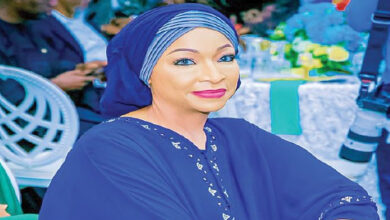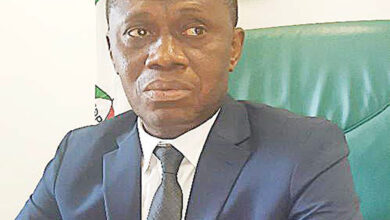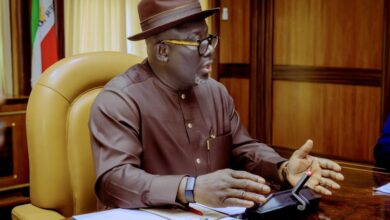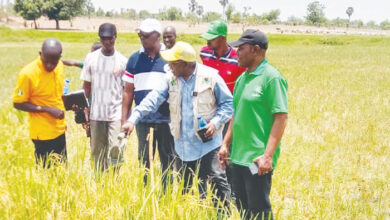Breaking boundaries: How Nigeria’s U-19 women are rewriting cricket history
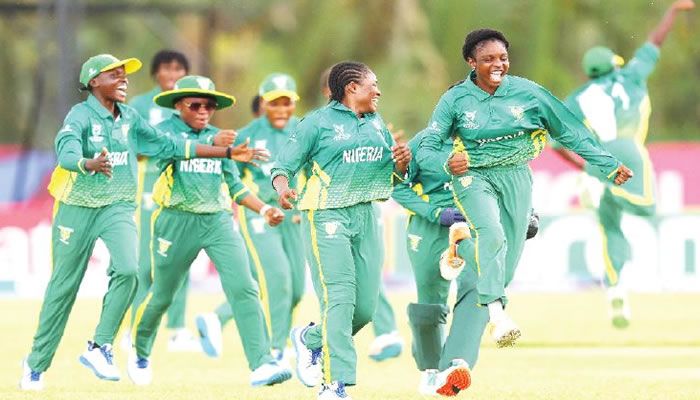
In the wake of Nigeria’s historic run at the 2025 ICC Women’s U-19 T20 World Cup in Malaysia, ABIODUN ADEWALE explores the remarkable rise of the young players redefining cricket in Nigeria and across West Africa
When the Junior Female Yellow Greens — Nigeria’s U-19 women’s cricket team — quietly departed Lagos in early January for the 2025 ICC Women’s U-19 T20 World Cup in Malaysia, there was little fanfare. Their send-off barely made national headlines. They were underdogs. Unknown, uncelebrated, and underestimated. But by the time they returned weeks later, their story had changed — and so had the story of cricket in Nigeria and across West Africa.
These young women didn’t just represent Nigeria. They reshaped their image on the international cricket stage, defying expectations and turning long-standing neglect into national pride. Their sixth-place finish at the 16-nation tournament wasn’t just historic — it was revolutionary.
Journey from Rwanda
The team’s fairytale didn’t begin in Malaysia. It started months earlier under the grey skies of Rwanda, where rain washed out the final game of the African qualifiers. Nigeria had already upset Zimbabwe, a Test-playing nation, earlier in the tournament. That solitary win, combined with the weather’s intervention, handed Nigeria Africa’s sole ticket to the World Cup.
It was a qualification powered by grit — and, perhaps, divine timing. For a region where cricket is still battling for recognition, the achievement was seismic. Thanks to their initial nerve-wracking win over the South African country in the round robin, Nigeria became the first West African country to qualify for a global women’s cricket tournament.
If qualifying was aided by heaven’s smiles, at the tournament, the Junior Yellow Greens turned doubters to believers.
When the team stepped onto the world stage, they didn’t flinch. They took on traditional powerhouses like New Zealand, Ireland, and South Africa, and even though they didn’t make the semi-finals, their resilience and flair made them one of the tournament’s most talked-about teams.
They made their presence felt by putting the country on the map, playing outstanding cricket against top-playing nations like New Zealand, South Africa and Ireland, finishing sixth at the 16-nation tournament which was eventually won by India.
It was also the first time a Nigerian women’s team would play at any ICC World Cup and the second time for the country, having featured at the men’s U-19 T20 World Cup in 2020. On both occasions, Nigeria was the first West African country to reach the heights.
When the team landed at Murtala Muhammed International Airport on January 31, Lagos erupted in celebration, not typical for a sport often overshadowed by football. But this wasn’t just about cricket. It was about young women rewriting history, transforming their lives and the future of sport in their country.
Curious onlookers and new fans gathered, some asking how Nigeria, a supposed cricket minnow, had pulled off such a feat. The truth? It didn’t happen overnight. Behind every wicket, every run, and every catch was a story of grit, sacrifice, and discovery.
Making of ‘Golden Girls’
“I can’t imagine my life outside cricket,” the captain of the team, Piety Lucky, told our correspondent during a chat after the team’s arrival.
“If I didn’t find cricket or if cricket didn’t find me, I can’t imagine because growing up was tough, especially the years before I started cricket. I was loved at home, and we were happy, but I feel like life would have actually been difficult. Travelling outside the country, earning a salary, where would I have gotten all these experiences from?”
Captain Piety Lucky’s name couldn’t be more fitting. Her story reads like a novel written by fate itself. Now 18, Piety’s journey to becoming Nigeria’s cricket darling began at age 11 when financial constraints forced her out of a private school and into Ujoelen Grammar School in Ekpoma, Edo State, where cricket happened to be introduced.
It was there that she picked up a bat for the first time. Seven years later, she captained Nigeria to its first ICC Women’s World Cup appearance.
Now 18, the Junior Female Yellow Greens skipper has been learning the ropes of the game at different levels for seven years, but she could have also missed her first step towards a breakthrough – the National U-17 Championships – if not for the intervention of her grandmother.
“Starting cricket, I wasn’t bad, and I got a lot of encouragement from my senior colleagues. But at home, I had issues with my mom because she was very protective. And I understand her fears, because as the first child, she wanted to keep me within parental control,” Lucky said.
“My mother had already insisted I was not going for the 2021 National U-17 Championships. A day or two before I was supposed to join other South-South players in Benin, my grandmother asked that I come to her place. It was even my mother who delivered her message.
“When I got to my grandma, she asked me if I wanted to go play in the tournament, and I said yes. I mean, it was a big opportunity; my name was on the list. So, she took out N1,500 from some church money that was kept with her because she also said she had debtors owing her, but it was too early to go ask for money, and I needed to travel that early morning. In short, she rescued me with that money while she waited for her debtors to pay so she could return it. I remember transport was N1,300, and my grandfather also gave me N500 to eat on the way. She also gave me her small phone, so I could call her when I get to Benin.”
At the 2021 championships, which was the second edition, Lucky ran the show and led her team to victory, In the process, she raised her bat for scoring a century (100 runs), becoming the first female to do that in Nigeria – a feat that didn’t only win her the Most Valuable Player at the tournament, but also secured her a scholarship from the NCF to further her education at any university of her choice.
Although she was instrumental to her team’s victory, she admitted that anything short of the scholarship would have ended her cricket career before it even started.
Before captaining Nigeria to the U-19 Women’s T20 World Cup, Lucky had featured prominently for the women’s senior team, playing a crucial role when the Female Yellow Greens won a historic bronze medal at the African Games in Ghana.
Now, aside from fulfilling her dreams on the pitch, cricket is also turning the other aspirations of the player into reality.
“Aside from cricket, photography is one thing I have 100 per cent passion for. I started learning baking and decoration after I started playing cricket, and that was enabled by the stability cricket has given me. I love cooking and will also be paying for some culinary training soon. The same thing for photography. So, right now, I am just trying to see how I will be able to include all these into my training and school schedule.
“All thanks to cricket, which has made all these easier. They could have just been ideas, but cricket has given me the needed support.”
Remarkably, Nigeria’s first-ever wicket at the World Cup was taken on the first ball as the girls ran out New Zealand’s Kate Irwin without her facing a delivery.
That wicked ball was bowled by Peace Usen, whose professional cricket journey just clocked a year.
Usen made her debut for Nigeria at the senior level four days before turning 16, when the Female Yellow Greens faced Tanzania at the 2023 African Games, which was held in March 2024 in Accra, Ghana.
In her second-ever T20i game for Nigeria, she made her mark, winning the Player of the Match award with four wickets as Nigeria upset Namibia by 55 runs to qualify for the semi-finals of the African Games, where they later won bronze.
Usen’s journey into the national team could be described as that of a passerby, having only observed the team at the NCF T20i invitational in Lagos a few days before the African Games.
“I started playing in 2020 and fully in 2021, but I only came to Lagos last year for training, and my coach told me to go and observe the national team. From ther,e I got an invitation to join the team for the African Games,” Usen told The PUNCH.
Although from Akwa Ibom State, Usen grew up in Benin City, Edo State. Going by the strong composition of both states in the women’s senior national team, it is safe to say she was forged biologically and geographically for cricket.
Like some others who have made the team before her, she was introduced to the game through the NCF and the Edo State Cricket Association schools outreach. From there, she began to learn under the tutelage of the late NCF tutor, coach Peter Guobadia, who died in 2023.
“I schooled at Benin Technical College, where I first met a man who later became my coach (Peter). He was not just a coach to me, he was a mentor. If not for him only God knows where I would have been. I still respect and give him that honour and gratitude even after his death.”
Within a few years of learning under coach Peter Guobadia, Usen was prepared for what was to come. She was primed to be a specialist in bowling and fielding, based on her strength and getting three wickets at the World Cup was a sign that she is coming of age.
“During the tournament in Lagos, I told her she would be travelling with the team to Ghana and also play. I could see she was shocked and happy at the same time. She tried to thank me and I made her realise it’s her hard work that earned her a place,” Female Yellow Greens coach, Leke Oyede, told The PUNCH.
Peace and Piety are not alone. Players like Shola Adekunle, Lilian Udeh, Christabel Chukwuonye, Peculiar Agboya, and Kehinde Amusa have their own stories of struggle — many had to fight familial doubts, economic hardship, or gender stereotypes just to keep playing. Most are recipients of NCF scholarships and part of the grassroots-to-national-team pipeline nurtured through school programs, youth games, and the PwC-sponsored U-17 Championships.
“Seven of them had already played for the senior team,” said NCF president Uyi Akpata. “That’s the result of strategic development — not luck.”
Celebration of sisterhood
The bond within the team is perhaps their most underrated asset. The return to Lagos wasn’t just a homecoming — it was a celebration of sisterhood. At a reception organised by the NCF, Gadar Abdulkareem, captain of the male U-19 team, joined servers to dish food to the girls in a symbolic gesture.
“In Yorubaland, we serve those who have achieved greatness to attract blessings,” Gadar said. “When we return from our own qualifiers, I know they’ll celebrate with us too.”
The Female Yellow Greens have become the new benchmark. Their success is already fueling inspiration for other teams — not just within cricket, but across Nigerian sport.
No shortcut to success
Before now and perhaps, still, people ask if Nigeria is a cricket-playing nation.
President of the Nigeria Cricket Federation, Uyi Akpata, is used to answering this question, but now there is an emphatic answer provided by the U-19 girls.
The World Cup success, which comes after the African Games bronze in 2024 are just two of the results that the developmental process of the NCF has yielded. The potential is more, according to the president, Akpata.
“Our five pillars of development have been: one, to grow the game of cricket in Nigeria. We set a target of reaching 500,000 kids every year and the second is to continue to have state-of-the-art facilities every year. Before, we couldn’t boast of any facilities but now we are hosting international tournaments in Lagos and Abuja. Another pillar is the quality of our players and coaches,” Akpata told The PUNCH.
“We don’t want any shortcuts to success. If not, I would go to the USA and Australia and we would see Nigerians playing cricket there but ours have to be a sustainable grassroots development and to create a general pathway for our people here. The fourth aspect of our strategy is commercial success. The right money has to come in and we are not lazy about it by asking the government to fund us. The government creates the right environment, but we need to partner with sponsors. Then we want to have continuous interaction with key stakeholders in terms of governance structure.”
Journey of decades
After becoming a member of the ICC in 2002, Nigeria waited for 17 years to qualify for their first World Cup, the 2019 ICC U-19, which was held in South Africa in 2020.
Before 2002, cricket was played in Nigeria as far back as the colonial era.
In the 1980s, the game had grown to some extent, and Nigeria could field a squad of siblings with the influence of the game moving from one family to the other, especially in the southern part of the country, which is still the biggest producer of talents for the country.
Names like Kofi Segoe (who later became president of the NCF), Kwesi Segoe, the Agodo trio, Kome Ejiro and Keme were among the prominent brothers who dominated the male national team at that time. Even the current president, Uyi Akpata and his kinsman Ewi Akpata were not left out.
Others include Osa and Obo Omoigui, Ladi and Segun Elliot and George and Paul Wiltshire.
For a country that has had an established federation since 1957, it took Nigeria more than enough years to come to global reckoning in cricket. Perhaps not surprising, women’s cricket, which in Africa is strongest in the south of the continent, has given Nigeria the biggest recognition yet.
Aside from the World Cup heroics, Nigeria has also been a regional winner of ‘Cricket 4 Good Social Impact Initiative of The Year’ for the cricket developmental activities at the IDP camp in Edo State, as well as the 100 per cent Cricket Female Cricket Initiative of The Year for the massive girl-child enrolment initiative in Zamfara State.
Building for tomorrow
While their sixth-place finish was historic, it’s just the beginning. The same core of players is expected to transition into the senior team, mirroring the male team’s growth since their 2020 U-19 World Cup debut. Nigeria’s first World Cup qualification came in 2019 — 17 years after gaining ICC status in 2002. That slow burn has now turned into an inferno of possibility.
Uyi Akpata isn’t just building teams — he’s building a movement.
“Our five development pillars are growth, facilities, quality, financial sustainability, and governance,” he explained. “We’re reaching over 500,000 kids annually. No shortcuts. Just consistent investment.”
Nigeria’s efforts haven’t gone unnoticed. Beyond the World Cup, the country has won ICC regional awards for social impact and female participation, including programs at IDP camps and girl-child initiatives in Zamfara.
Glorious future in view
For many Nigerians, the success of the Junior Female Yellow Greens has redefined what is possible in sport. Cricket, once overlooked, is now an avenue for empowerment. A symbol of what happens when talent meets opportunity.
“We’re just getting started,” Piety said. “If we can reach this level now, imagine what we’ll do in the next few years. We want to play at the senior Women’s World Cup — and win.”
She pauses, then adds, “We’re not just playing cricket. We’re making history.”
From dusty school fields to global arenas, the Nigerian golden girls have risen — not just as athletes, but as symbols of hope, perseverance, and national pride. And if their journey has taught us anything, it’s that sometimes, the most extraordinary stories begin in the most ordinary places.
